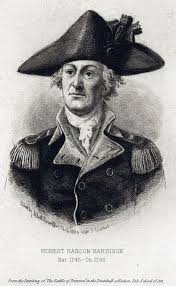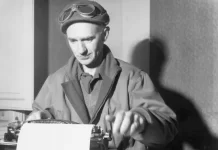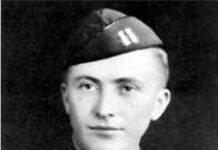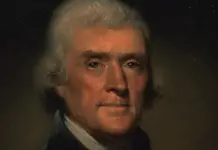Even before the American Revolution, the name Scudder was highly revered and respected throughout the eastern part of the continent that would become the United States of America. However, there are varying accounts of when the Scudders first arrived and from which part of the British Isles they emigrated.
What is certain is that two Scudder brothers arrived on these shores in the 17th century, landing in Massachusetts, where one settled, while the other moved on to Long Island and was well established there by 1630.
That was Thomas, a miller in Huntington, Long Island, where he married and had a son he named Jacob. Jacob grew up on the Island until moving to what became known as Scudder’s Mills, just southeast of Princeton. He and his wife, Abia later settled near Monmouth Court House, now Freehold, and raised their three sons and three daughters. Nathaniel was the eldest of the half dozen and was born May 10, 1733, most likely at Monmouth Court House.
Nathaniel was in the fourth graduating class of the College of New Jersey, now known as Princeton, in 1751, and immediately launched into the study of medicine. During his years as a physician, he was highly respected, and had an extensive practice throughout Monmouth County.
Nathaniel married Isabella Anderson, the only daughter of Colonel Kenneth Anderson, the year after his college graduation, and following a charming and whirlwind romance. The History of NJ Medicine records the courtship and romance as told a century later by Dr. Scudder’s granddaughter, Maria.
Seems the beautiful Isabella, a member of an old Scottish family that came to the colonies during the Scottish troubles of 1715, came to church services on horseback, and was quickly seen and appreciated by a young college graduate, Nathaniel Scudder. She alighted from her horse and fastened him to a tree before walking up to and into the church. The daring young medical student went up to the horse, disarranged the equipment and entangled the bridle before he, too, went into church. When service was over, and young Isabella went back to her horse, only to be chagrined by the entanglement, Nathaniel suddenly appeared, quite dignified and graceful, and offered to come to her assistance. He righted all the reins he had entangled, then assisted the young lady into the saddle. He mentioned to her that since they were both traveling in the same direction, a distance of some four miles or more, he felt the need to travel with her and offer her protection. She acquiesced to his gallantry, Nathaniel mounted his own horse, and the two rode off together, the beginning of a courtship that culminated in a marriage in 1752 and ultimately the birth of three sons and two daughters.
The young Dr Scudder had a lucrative and popular medical practice in Monmouth County, but also held a strong belief the nation should sever ties with England. HE was a staunch believer in religion as well and ,a member of old Tennent Church
But as the little colonies grew closer to war and New Jerseyans heard reports of how the British soldiers were taking over and burning Boston, Dr. Scudder was among the first to become involved. At a meeting of citizens held in Freehold on June 6, 1774, a full two years before the Declaration of Independence, Dr Scudder took a leading role and drafted resolutions of sympathy for Boston and support for the cause of freedom.
His involvement in the freedom cause came quickly after that, and he was named to numerous positions of authority and leadership. He was a member of the local committee of public safety, a delegate to New Jersey’s first provincial congress and was speaker of the legislature within two years. When the First Monmouth County Regiment of militia needed more men, Nathaniel hung up his stethoscope and signed on. He became a lieutenant-colonel in the First Regiment of Monmouth militia under Col. George Taylor, whose father, Edward Taylor, owned Marlpit Hall. By November, five months after the Declaration was signed, LT Col. Scudder was promoted to colonel and took charge of the regiment of soldiers who all came from the Freehold and Middletown area. Taylor had resigned his post to join the Loyalists.
It was not safe to be a rebel anywhere on the continent, but particularly in New Jersey with its highest concentration of Loyalists among all the colonies. Families were torn apart by the differences of opinion on whether this distant piece of land and its English people should remain loyal to the King, and his heavy taxes without representation or take on the world’s strongest nation and fight for independence. Loyalists, some of whom remained soldiers simply to function as spies and report troop movements to the British generals, burned or otherwise destroyed the homes of their rebellious neighbors and former friends, took their cattle and destroyed their crops.
The Monmouth militia had little success under Scudder’s first leadership, dissolving during a period of “Tory Ascendancy” Scudder became the commander, but the militia dissolved around him.
He then attached himself to a Pennsylvania Continental regiment and within a few weeks, the Monmouth militia was reconstituted and spent a month encamped on the Highlands, with a mission to guard Monmouth County against a British invasion from the troops stationed at Sandy Hook. By February, Scudder’s militia participated in the Battle of Navesink, surprised by the British and falling to them with the loss of more than two dozen militiamen killed and another 70 captured.
Dr Scudder resigned from the militia to devote more time to politics, feeling he could do better as a legislator. In 1777, he was elected a delegate to the Continental Congress, but did not attend a session for nearly a year, because of his militia obligations. He declined another term after serving two years.
So he was out of the military in June 1778, though a Congressman, When General Charles Lee began his march through Monmouth County. Scudder joined the fray, in what historians have later said was a true turning point of the war. Though not a clear cut victory, the British had fled the town under dark of night while General George Washington was preparing an attack at daylight.
BY 1780, he was an avid supporter of the “Retaliators”, vigilante Patriots who practiced violence against Loyalists and suspected Loyalists. They were illegal and dangerous by many of the state’s leaders but Scudder lobbied the governor and Continental Congress on behalf of the group. He then returned to office, as a member of the NJ Assembly and retired from active ser ice, preferring to devote his time to military work.
Ironically, Nathaniel Scudder, Doctor, Congressman, local leader, soldier, patriot, came through the war years unscathed. But in 1781 assisting his old friend from the Monmouth Militia, General David Forman, he was with the general in ousting Loyalist raids on bayshore lands. A band of refugees landed at Sandy Hook, made their way to Colts Neck, and took six prisoners before being discovered. Once the alarm was sounded, Dr. Scudder told his family that a battle was “expected at Long Branch. I will go down and bind the the wounds of the poor fellows.” With other patriots from Freehold, Dr Scudder took off in pursuit of the Loyalists, in an effort to recapture the prisoners. Near Black’s Point, in what is now Rumson, Dr. Scudder and General Forman were standing on the bank talking when a shot was fired, aimed at Forman. But, as the general told it later, he had made an involuntary step backward, describing it as “the most fortunate step of my life.” Though the bullet missed him, he struck and fatally injured Dr. Nathaniel Scudder. It was four days before the Battle of Yorktown and the surrender of the British to their American foes.
Dr. Scudder therefore became the only Congressman to lose his life in battle during the Revolutionary War. He is buried in Old Tennent Courtyard, and his in ground tombstone reads
IN MEMORY OF THE HONOURABLE NATHANIEL SCUDDER WHO FELL IN DEFENCE OF HIS COUNTRY OCTOBER THE 16TH 1781 AGED 48 YEARS



